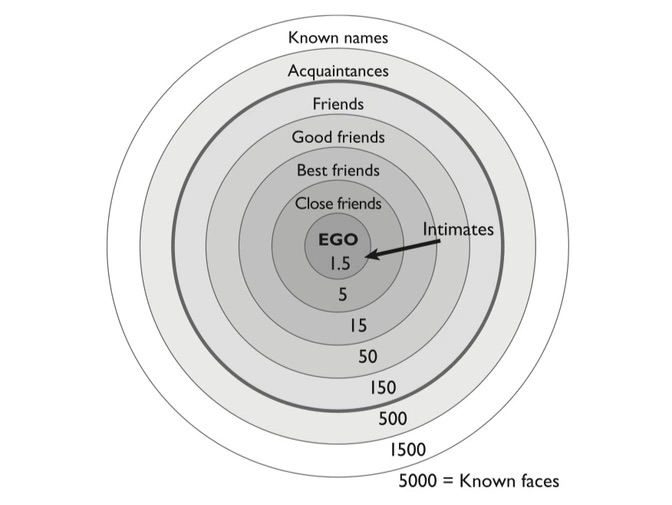

I hear you. I always found it to be very unfortunate :/


I hear you. I always found it to be very unfortunate :/


Hear hear, I’m the same way. I went further and tried it out and like a pokémon, hurt myself in confusion.


Of course! Here’s is a link I have more resources as well if you’d like.
A quote from another article I have saved:
According to John Cacioppo, a social neuroscientist who specialized in the study of loneliness (he died in 2018), humans would have evolved a built-in bias against easily making friends because avoiding an enemy would have been more important than making a friend. “If I make an error and detect a person as a foe who turns out to be a friend, that’s O.K., I don’t make the friend as fast, but I survive,” Dr. Capiocco said in a 2017 interview in The Atlantic. “But if I mistakenly detect someone as a friend when they’re a foe, that can cost me my life. Over evolution, we’ve been shaped to have this bias.”
A link for the second article here


Ah, ok makes a ton of sense. Thanks for the response.


Interesting, thanks for the response. Robin Dunbar is a psychologist and anthropologist who studies friendship. His claim to fame is ‘Dunbar’s Number’ which is a general statement of how many friends a person can have. It varies from person to person and is influenced by one’s environment, age, beliefs, etc.
He has a way of expressing how relationships manifest themselves based in closeness, I have an  here.
here.
This seems to map to what you’re saying. Another thing he said was that the more close friends you have, the less acquaintances you’ll have, and vice versa. There are limits to the number of people you interact with and it can be seen as a sort of hierarchy.
I wanted to ask to get a better understanding: Why do you prefer more time with your kids and wife? Is the idea that your time is better spent to positively affect them and yourself (i.e. enjoying your time with family) and it’s better to ‘put your eggs in one basket’ so to speak? That there is an investment required to have some kind of benefit to make it worthwhile to spend time with others and with family there is a predictable outcome? Do you ever actively engage in criteria to evaluate the methods, reasons, or heuristics you use to determine who to spend time with or who to allocate resources to?
My notion is more investment is given to those who we are closer to due to some perceived positive effect but those heuristics are only ever rules of thumb and wholly influenced by reasons outside of our control. The conclusion is made and then we work backwards to find justification.
I have a friend who spends every weekend with their family, in the infrequent times we do see one another they complain about their parent’s misunderstanding and causing them distress. Rightfully so, as their parents are a bit old-fashioned to say the least. What confused me was, this is a bit machiavellian, they have already seemingly reaped many of the benefits from engaging with their parents and they may be better suited to distributing their time intentionally so as to have a better outcome for themselves and even their parents who are a bit reliant on them and whose ways are set-in further as the friend plays their part in the pattern. They are acclimatized to their environment (with their parents) and the extent that they can predictably or intentionally cause meaningful improvements or positive outcomes is set.
I always thought it would make sense to continually test alternative strategies because at any point one can become ‘comfortable’ at a given local minima or maxima more or less arresting any further development or change. The violent refusal when the topic is broached, and the absolute certainty to which they claimed their current method was superior caught me off-guard and made me confused.


Could I ask why you don’t want to talk to half the people you know? I have the opposite issue where I try to talk to people I know but they don’t reciprocate, I’m finding it hard to imagine the inverse.


It felt very condescending :/
I think you can congratulate or acknowledge someone’s talents or skills without being off putting towards those who don’t have them. I think the stuff the maker does is incredible and the tone by the journalist is strange, I would really like to know their reasoning to get a better understanding.


their emojis also display super huge on other instances which i find hilarious but can get very annoying for others


I agree and want to add that Canada didn’t have the same kind of AI Winter that the US and other places experienced. There’s at least some finding, though as you said not nearly enough…


Dang, they thought of everything!


I think there are a few instances where mentioning your own inability or failures are ok. One would be where it’s qualified with like, appropriate measures to ensure it doesn’t happen again.
Like if I say I’m flawed and not perfect, it makes sense to think something like this might happen again and hey here are the mechanisms or things in place to ensure my non-perfectness can be addressed and mitigated so as to cause the least amount of harm for others (at my own expense).
Of course this is not at all what was done or what tends to be done :/


Question for the folks in here, are there any inexpensive SBCs with USB-C that can do data and power under ~80 USD? I’ve seen I think the Orange Pi 5 and a few others but I’m not sure what the track record on support is.


Thanks for the response. What you shared is the same experience I have with Google :/


Does anyone have any examples of Linus genuinely admitting he made a mistake or was wrong in a way where he dealt with a modicum of consequence? I can’t think of any, but I don’t watch him very much, at least recently.
Maybe if a video is made about this then that amplifies the Nexus video and the criticisms it had. By not meaningfully engaging with it, they are not exposing it to their audience which is substantially larger than Gamers Nexus.
I think it could be that he does do it eventually though, after he finds better arguments or finds support from his community.


I’ve been eying Kagi and Orion. How do you find Kagi? I spend so much time fighting with Google SEO if it’s half decent I would switch. I’m just wary that my searching methods wouldn’t work well in Kagi.
Did you find it straightforward to adjust to how Kagi works?
This is hard to believe, it seems too comical.
I believe you of course, and without accumulating enough about Linus’ & LTT’s antics I would have doubted you. I wonder what it is that causes these kinds of things to happen. I want to say success but I think there may be something about their ethos. Not what they espouse but what they sorta believe internally.
When I was younger, I’d save my lunch money for weeks to buy a game and fast during school. I’d do my best to fill my stomach with as much water as I could.